At a glance
The Sustainability Innovation Campus (ICN) is a joint initiative by the University of Freiburg (UFR) and the Karlsruhe Institute of Technology (KIT). Under the guiding principle “Transformations for Urban Regions of the Future: Climate Protection, Resource Conservation, and Well-Being“, the two universities are setting their sights on comprehensive social, technical, and economic innovations – along with a network of actors from science, industry, politics, administration, and civil society. Together they aim to contribute to the ‘great transformation’ towards a sustainable society.
The research and transfer activities of ICN are based on a holistic approach: In contrast to conventional (purely) technical innovations, system innovations are combined with entrepreneurial, ecological, and social innovations, thus making social change possible in the first place. The simultaneous further development of the innovation ecosystem – a network encompassing everyone from the actors generating the ideas for innovations and those implementing them to the users – has the goal of expediting the transfer of sustainability innovations.
The idea of the innovation campus is to create a research and transformation hub for sustainability innovations – internationally visible and regionally effective. The Upper Rhine region is already being hit particularly hard by the consequences of climate change, and they will become increasingly severe in the coming years. These circumstances call for swift and targeted action.
The need for profound social transformation in the area of sustainability is also reflected in the coalition agreement of the Baden-Württemberg state government: The State of Baden-Württemberg has set itself the goal of becoming climate-neutral by 2040.
On 15 July 2024, the ICN took part in the Käpsele Innovation Festival in Freiburg, and before that at the Munich University Symposium Munich (15/16 May) and at the TransferAllianz conference (7 May). More about this under “Documentation of Past Events”.
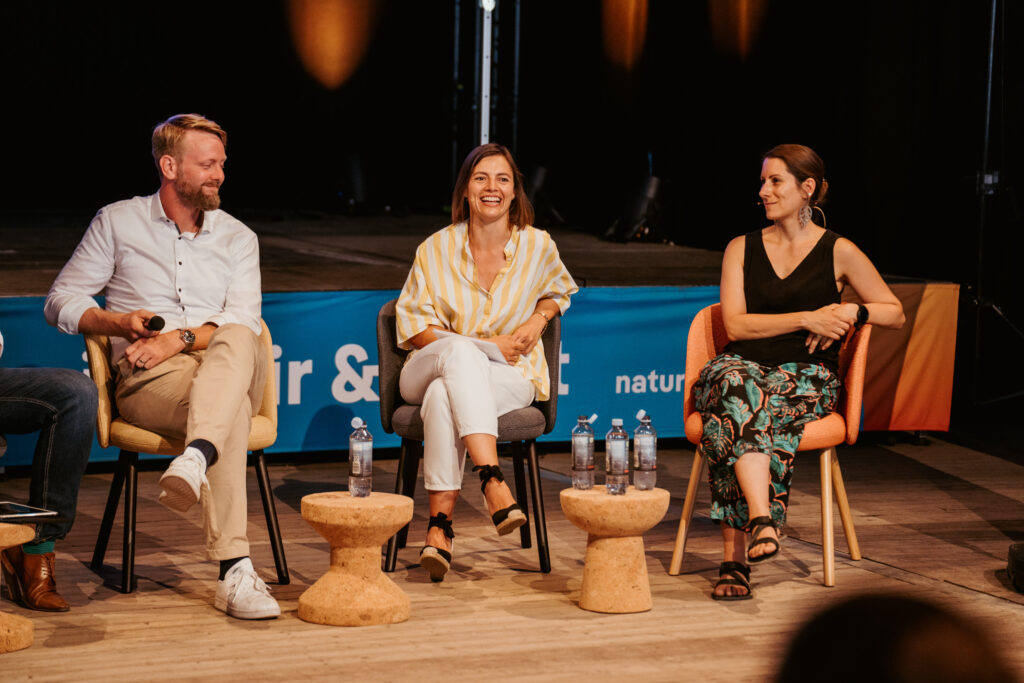
We would be happy to inform you about further developments, calls for proposals, and events at the Innovation Campus. Please feel free to subscribe to our mailing list by sending a message to innovationscampus-nachhaltigkeit-subscribe@listserv.uni-freiburg.de.
You can access our recent newsletter here.
In December 2022, the Baden-Württemberg State Parliament passed the budget for the years 2023 and 2024, which includes an initial one million euros in funding for ICN in the year 2024. The ICN is also being supported by the Eva Mayr-Stihl Foundation during its start-up phase
On 4 October 2023, the University of Freiburg and the Karlsruhe Institute of Technology (KIT) invited representatives from science, industry, politics, and civil society to an initial information and network meeting under the motto ‘Transformations for Urban Regions of the Future: Climate Protection, Resource Conservation, and Well-Being’. Participants discussed ideas for shaping the three innovation fields of climate protection, resource conservation, and well-being in working groups and in a panel discussion.
The kick-off on 24 January 2024 marked the official launch of the Innovation Campus Sustainability (ICN). At the opening event in Freiburg, Science Minister Petra Olschowski announced the first six projects to receive two years of funding as part of the ICN:
- Researchers from the project ZUKAMAS: ZUkunftsorientiertes KlimAwandel-MAanagement für Städtische Grünflächen want to discover how green space and city trees contribute to adapting urban habitats along the Upper Rhine rift valley to climate change. This will include, for example, identifying suitable tree species and analysing the ecosystem performance of trees. Together with local residents and city planners, they will develop measures to preserve urban green space.
- Another project concerns the Sustainability Transformation of Community Catering. The researchers are investigating how group catering – for example in refectories and staff canteens – can be rethought in a way that conserves the climate and resources, and at the same time promotes health.
- The Visions of Sustainability project will present a series of films about sustainability together with Harmonie Arthaus Kino Freiburg, der Community College Freiburg and the Greenmotions film festival. The researchers and their partners want to find out whether this kind of film can help citizens to develop a sustainable way of life, and if so how.
In addition, three other exploratory projects will receive seed money funding: NaWo-Collab – Transdisciplinary Collaboration for Sustainable Living and Building, KBR-Innovation-Communities – Strengthening and Consolidating Innovation Communities on the Basis of the Climate Citizens’ Council of the Freiburg Region and PROLOK – Process Scheme for Localised Heat Adaptation in Small Municipalities.
The scientists of ICN follow approaches of transformative and transdisciplinary sustainability science, which are characterized especially by the following five criteria:
- a comprehensive reference to sustainability,
- a solution orientation,
- interdisciplinarity based on excellent disciplinary research,
- transdisciplinarity,
- as well as reflexivity and adaptation.
In doing so, they link engineering development work with social science issues from the outset.
The fields of innovation of ICN – climate protection, resource conservation, and well-being – are based on the sustainable development goals (SDG for short) of the United Nations in the areas of climate adaptation and mitigation (SDG 13), resource efficiency/resource conservation (SDG 7,12,14,15) and societal well-being (SDG 2,3). At the same time, the fields of innovation are a reflection of the three sustainability dimensions economy, environment, and society. All processes, projects, and activities of ICN are located in these areas and at their intersections. The goals of the three fields of innovation are closely interlinked and are taken into account accordingly in each case.
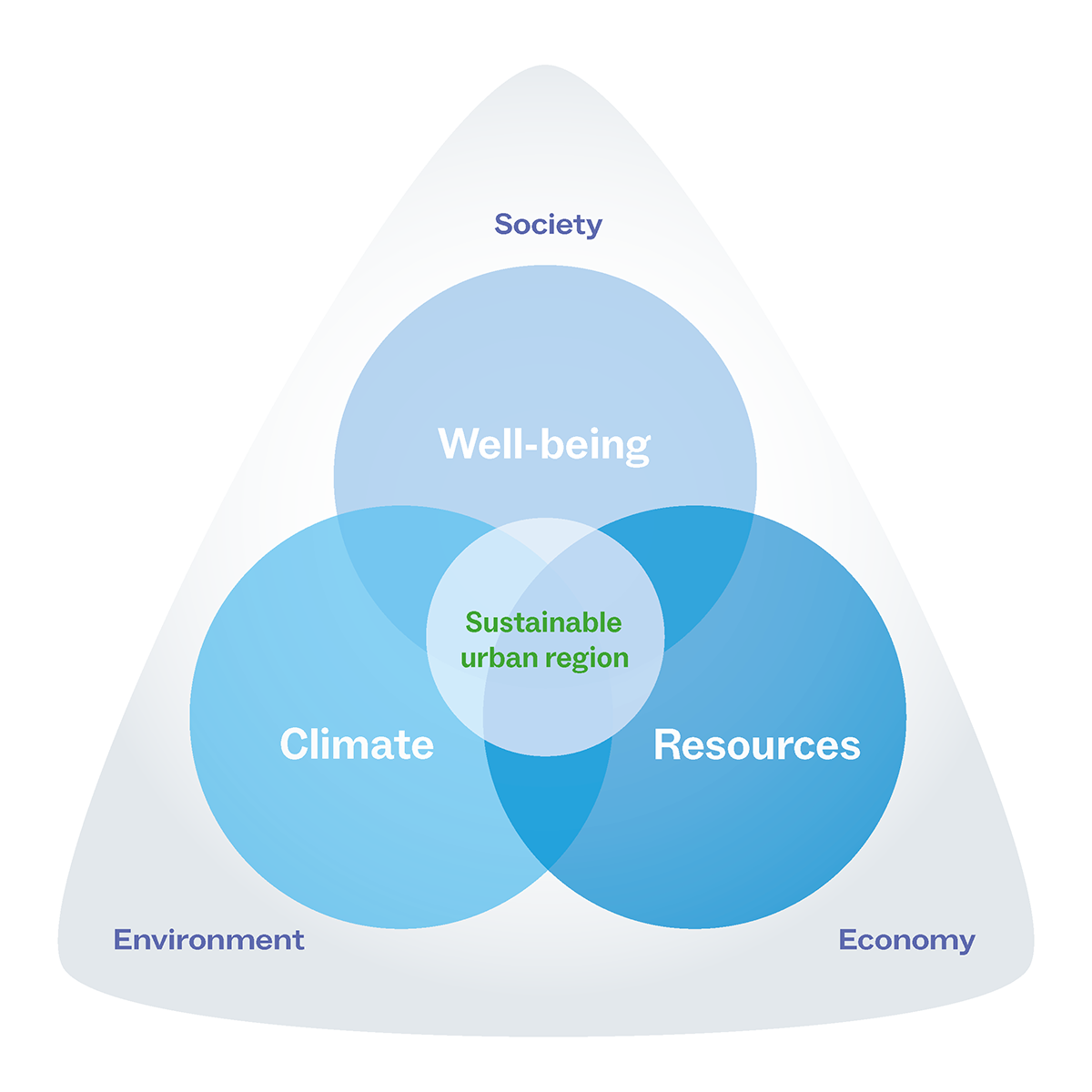
Climate protection
The application-oriented basic research conducted in the climate protection field of innovation aims to achieve climate neutrality in Baden-Württemberg by no later than 2040 – well ahead of the federal government – despite relatively low wind power potential and while maintaining economic value creation.
Resource conservation
This field of innovation is about facilitating the transformation towards sustainable resource conservation, circular economy, and bioeconomy. The goal is to develop the Upper Rhine region into a model region for sustainable products, processes, services, and infrastructures, also including innovative regional value creation to strengthen rural regions.
Well-being
The ICN’s understanding of well-being encompasses individual, social, economic, and ecological aspects. Accordingly, the solution-oriented research in this field of innovation aims to enhance the well-being of all citizens in the Upper Rhine region through systemic changes.
A big goal requires strong networks so that urban regions on the Upper Rhine, which are particularly affected by climate change and at the same time strong in innovation, can become laboratories for system innovations. The applicant universities UFR (with the university medical centre) and KIT form the core of these networks.
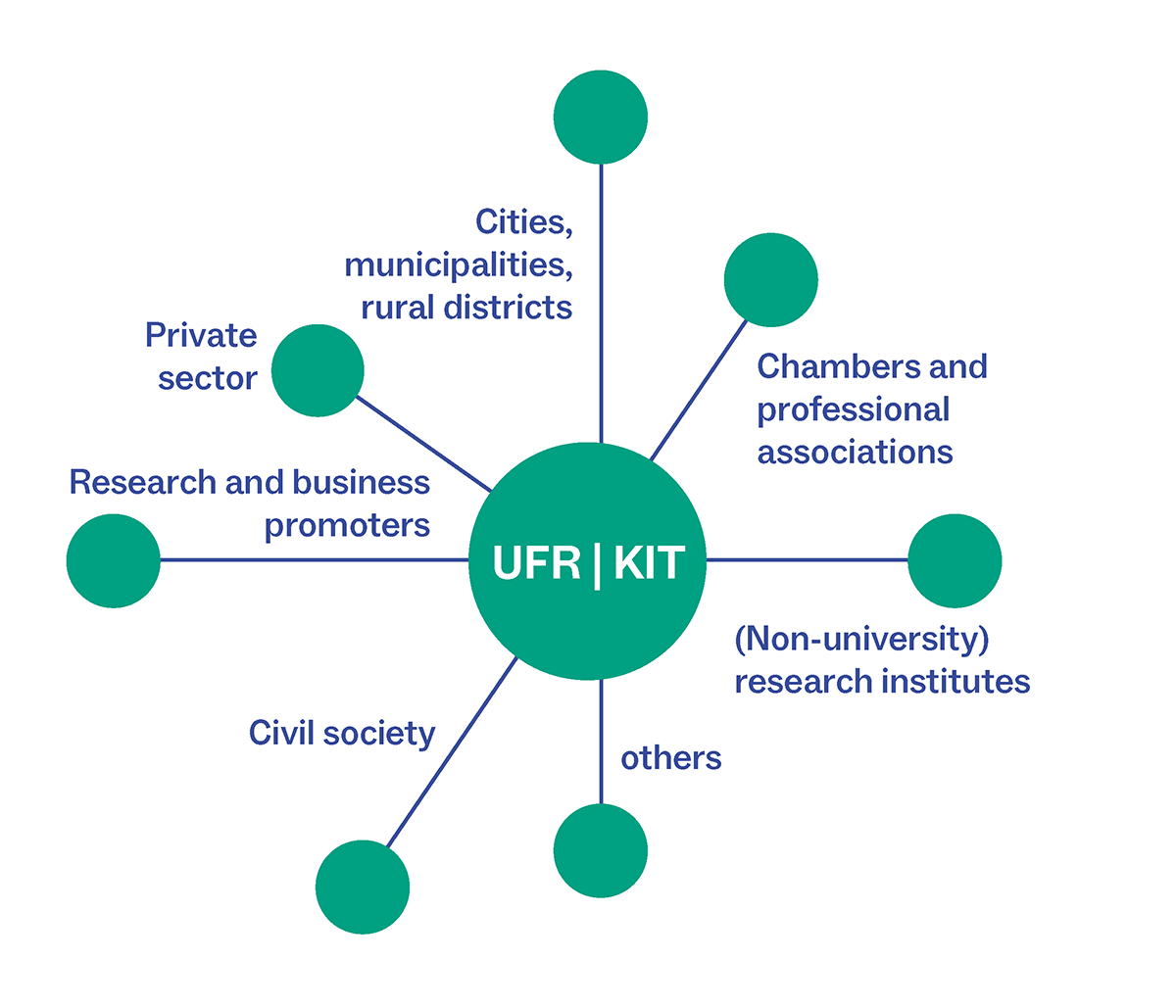
In addition, actors from numerous other fields are instrumental for the development and implementation of the research at ICN, as the vision of ICN can only be realized through their involvement. They include partners from the private sector; (non-university) research institutes; cities, municipalities, and rural districts; civil society, including NGOs; chambers and professional associations as well as research and business promoters; media; etc.
If you too would like to be a part of the network, please feel free to subscribe to our mailing list. We will keep you up to date on further developments, calls for proposals, and events at ICN.
innovationscampus-nachhaltigkeit-subscribe@listserv.uni-freiburg.de.
Käpsele Innovation Festival (15 July 2024)
The Käpsele Innovation Festival took place for the first time on the grounds of the ZMF on 15 July 2024. The ICN was represented by Dr Nina Kulawik, who discussed the limits of green technologies with Karlkristian Dischinger, CEO kd-holding GmbH, Andreas Schäfer, Business Development Manager Hydrogen, Lisa Langer, CFO ionysis and Florian Reiners, founder of Wiferion GmbH. With 600 guests, the festival was fully booked and the ICN with its two Freiburg managing directors was able to introduce itself to a broad regional audience and further expand its network.
Report in Badische Zeitung: https://www.badische-zeitung.de/das-erste-kaepsele-innovation-festival-in-freiburg-war-ein-erfolg-es-war-vielleicht-nicht-das-letzte
Photo gallery of Badische Zeitung (two photos of the panel): https://www.badische-zeitung.de/fotos-600-gaeste-feiern-innovation-statt-musik-auf-dem-zmf-gelaende
One of many LinkedIn posts: https://www.linkedin.com/posts/freiburg-wirtschaft-und-innovation_kaepsele-speaker-nachhaltigkeit-activity-7217422543211655168-w48p?utm_source=share&utm_medium=member_desktop
News report from Baden TV Süd: https://www.baden-tv-sued.com/mediathek/video/das-kaepsele-innovation-festival-in-freiburg-moechte-zukunftsideen-erlebbar-machen-2/

Hochschulsymposium München (15/16 May 2024)
On 15 and 16 May, Dr Dörte Peters was a guest on behalf of the ICN at the XVII Hochschulsymposiumin Munich entitled ‘Sustainability in science: the need for new forms of cooperation’. Lectures, panel discussions and personal exchanges highlighted the importance of creating space for dialogue between science, politics, business and society.
TransferAllianz Conference (7 May 2024)
On 7 May, Dr Nina Kulawik participated in the panel ‘Impact mit Nachhaltigkeit’ at the TransferAllianz conference on behalf of the ICN. The session dealt with the design of transfer activities with regard to sustainability and the selection of suitable sustainability concepts. The discussion showed why it is worthwhile for scientific institutions to emphasise the topic of sustainability in transfer. It focussed in particular on the important role of interfaces such as the ICN and the significance of transdisciplinarity in the transfer of knowledge in science and society. Other speakers included Christian Brei, Vice President of Leuphana University Lüneburg, and Isabel Gomez, Managing Director of C2C LAB, Berlin. At the conference, the ICN was presented to a broad audience from science and society and valuable contacts were made.
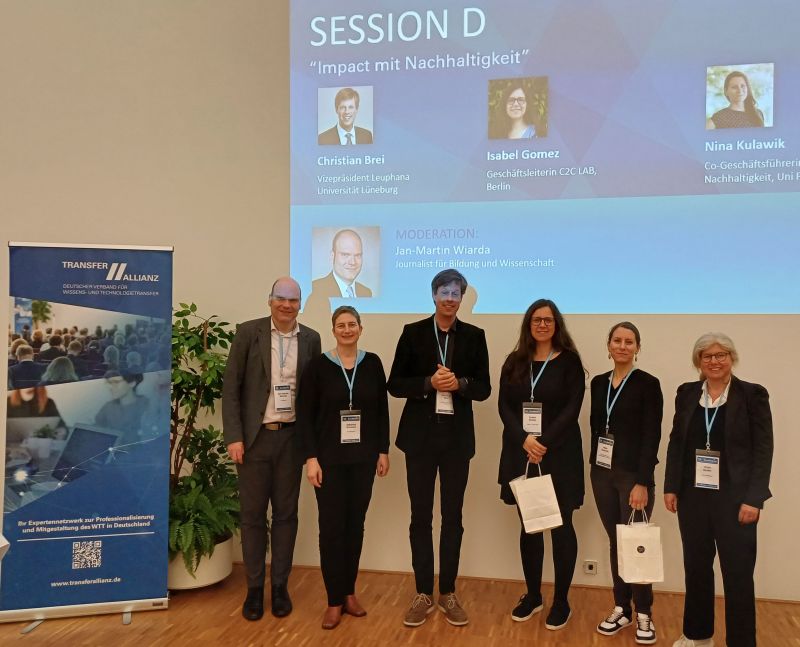
Kick-off of the ICN projects (7 May 2024)
On 7 May 2024, the kick-off of the ICN projects took place in the Senate Hall of the KIT in Karlsruhe. This event centred on the special, transformative and transdisciplinary character of the innovation campus model recently established by the state of Baden-Württemberg. The aim of the workshop was to exchange information on the specifics of the ICN across all projects, to enable close networking between the projects, and to optimise their work during the ICN’s development phase. The workshop served to find out where the individual projects stand, where they want to go and how they can be interlinked with the overall concept of the ICN and its structure.
As a result, numerous synergies emerged between the funded projects in the areas of transformation/innovation, for example with regard to the potential linking of the various innovation ecosystems, which can contribute to better visibility and greater reach of the projects.
Full documentation of the kick-off of the ICN projects (German only)
Kicking off the ICN (24 January 2024)
At the ICN kick-off event on 24 January 2024 in Freiburg, Minister of Science Petra Olschowski announced and presented the ICN ’s first three start-up projects and three exploratory projects. Read more in the ICN kick-off press release.
0f5c9bdf2b09f1e94a15ef1dd4f0e22d
Initial information and network meeting
On 4 October 2023, the University of Freiburg and the Karlsruhe Institute of Technology (KIT) invited representatives from science, industry, politics, and civil society to an initial information and network meeting under the motto ‘Transformations for Urban Regions of the Future: Climate Protection, Resource Conservation, and Well-Being’. Participants discussed ideas for shaping the three innovation fields of climate protection, resource conservation, and well-being in working groups and in a panel discussion.
‘The enthusiastic response and intensive exchange between the participants have already stimulated the development of the campus at this early planning stage’, says Daniela Kleinschmit, the University of Freiburg’s Vice Rector for Internationalization and Sustainability. ‘We want to start building up a network as early as possible, because this will be decisive for the work and the success of the Sustainability Innovation Campus – and we are very much looking forward to intensifying and expanding the network’.
Full documentation of the information and networking event
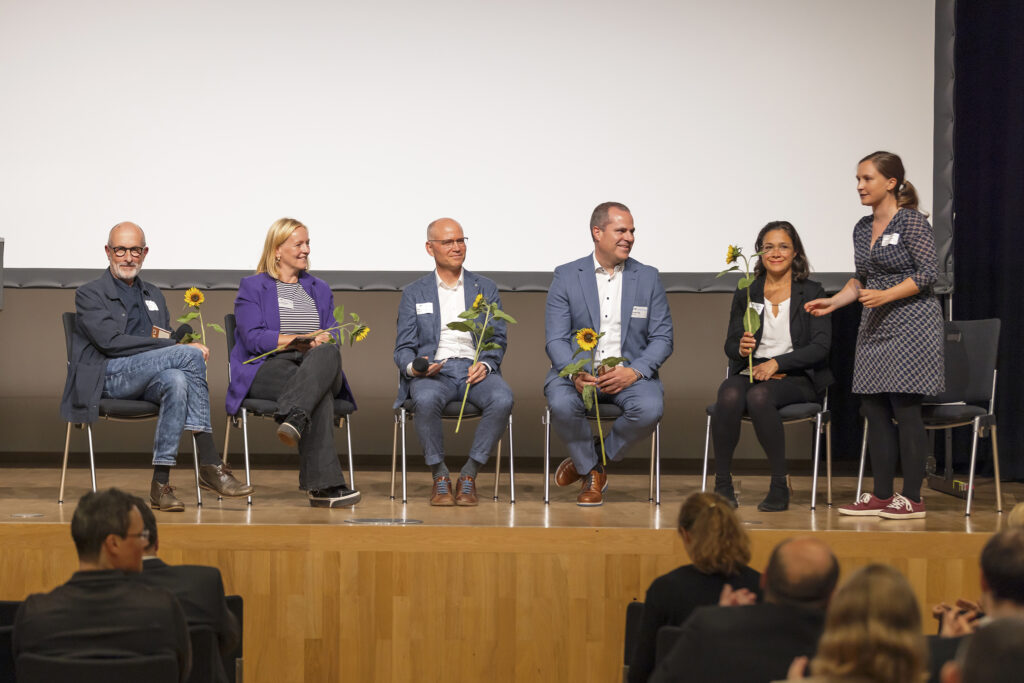
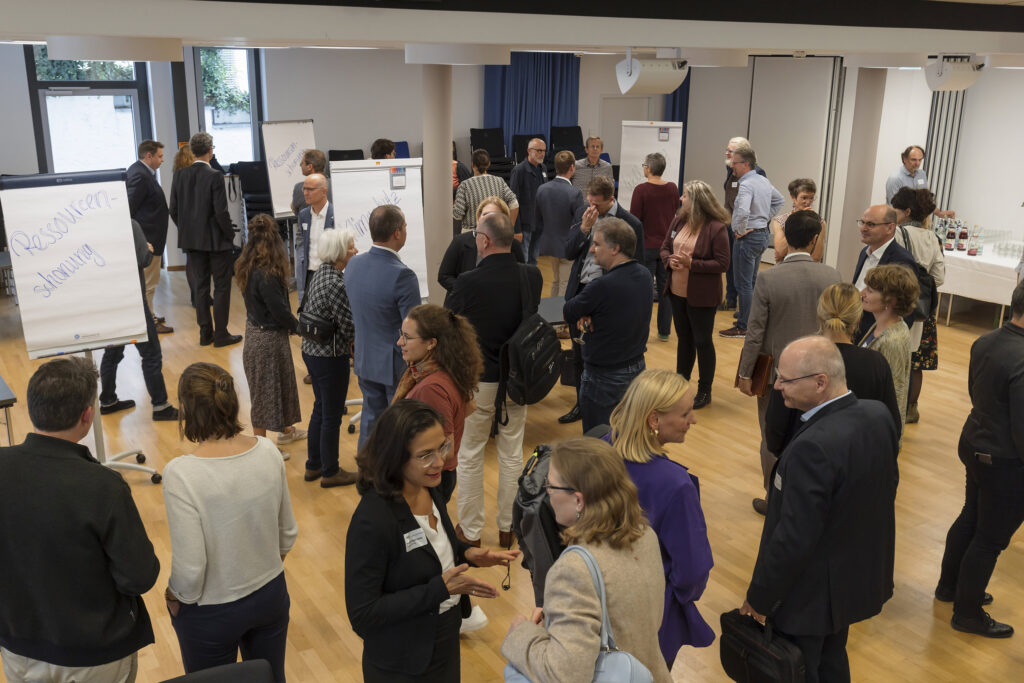
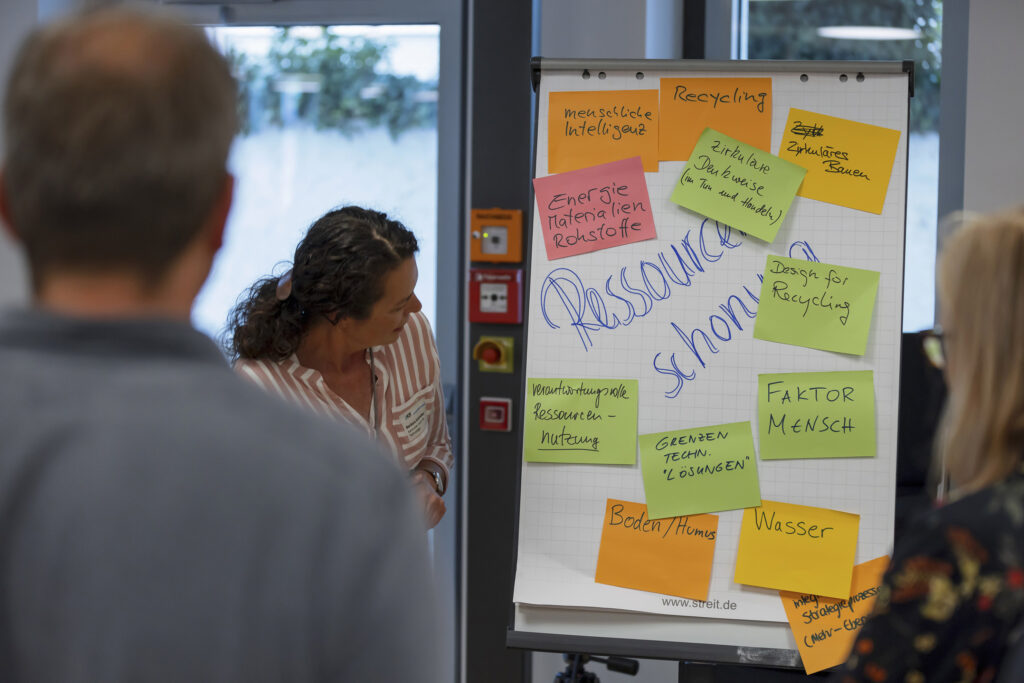
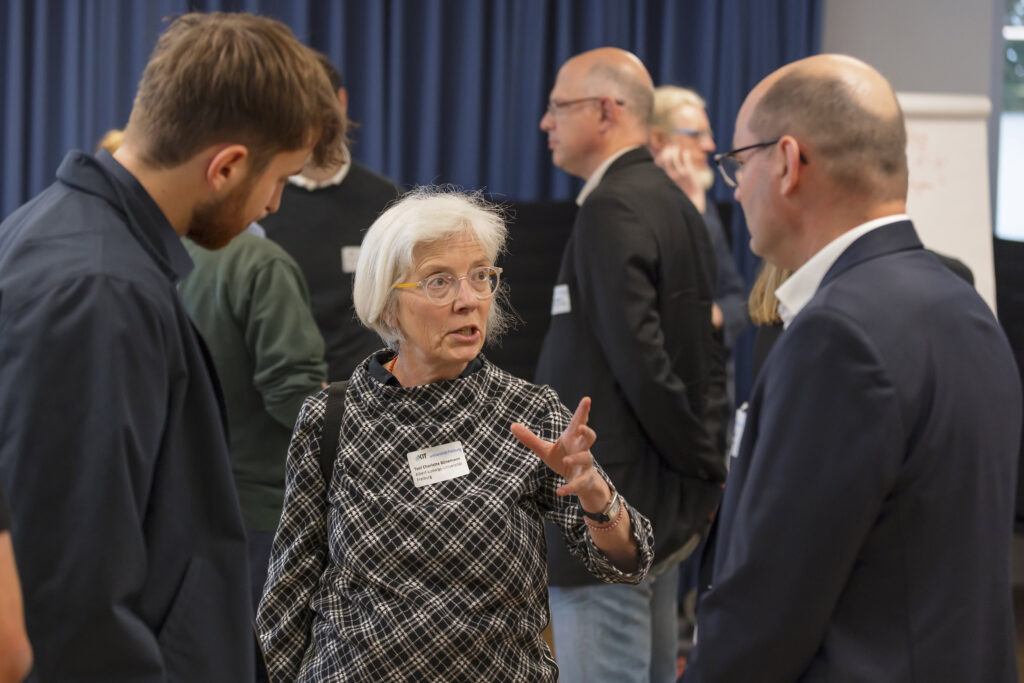
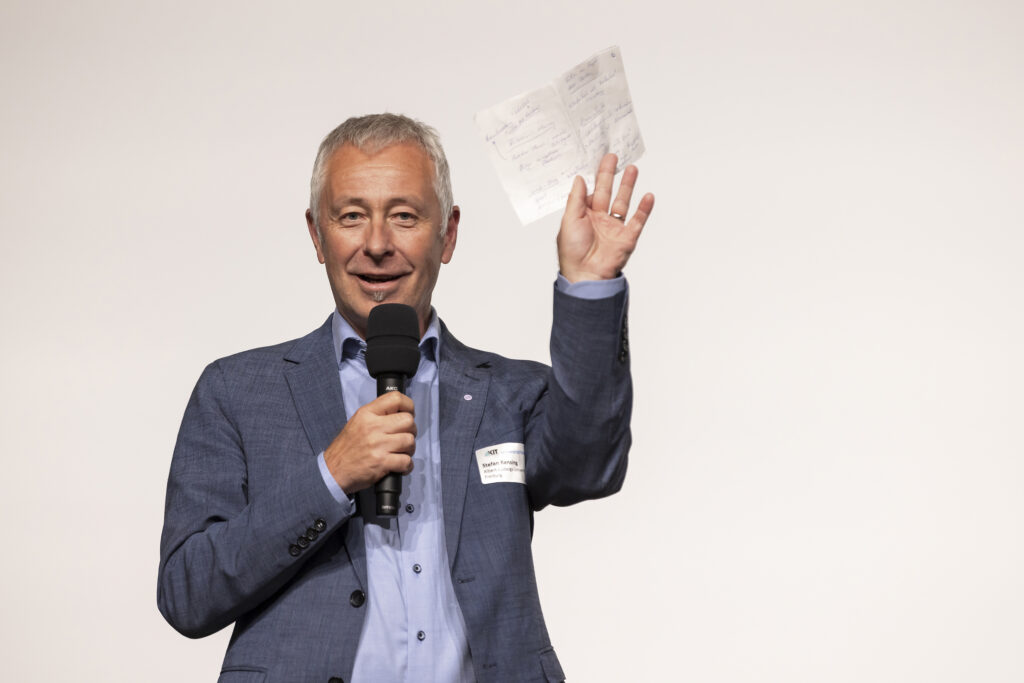
Impressions from the networking event in October 2023








